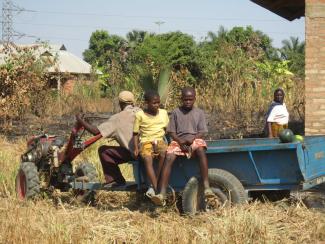Afrotopia
A vision for Africa

About 50 years ago, the last European colonies in Africa gained independence. White minority rule ended in South Africa in the 1990s. Nonetheless, at least some of the continent’s 54 countries seem to be in a permanent crisis. This scenario reinforces ancient stereotypes of Africa as a dark place marked by poverty, hunger and war.
However, the criteria by which Africa’s development and future perspectives are measured are derived from a western development model, writes Sarr in his book “Afrotopia”, which was recently published in German. According to this model, development is primarily understood as catching up in economic terms.
The focus of catch-up development is not set on people’s well-being, but on the growth of a nation’s gross national product and its position in the global market. The professor of economics at Gaston-Berger University in Saint-Louis in Senegal points out that Africans seemed to have no choice but to play the role of the west’s underprivileged pupils in order to be respected. Sarr’s name should be familiar to western readers. In 2018, he attracted attention as the co-author of a report that demanded the return of African cultural assets looted during colonialism (see blog post by Hans Dembowski on our website). The report was written on behalf of French President Emmanuel Macron.
Slavery, colonialism and resource extraction have left marks on Africa and in the souls of the people. The continent lost up to 224 million people through the slave trade and its impacts. According to Sarr, it will take centuries to recover from the loss of labour and natural resources. Among some western observers, the idea still prevails that “the west brought civilisation to Africa”. In Sarr’s eyes, it must not be forgotten how much suffering the colonial powers caused and that the current crises, to a large extent, result from their rule.
Moreover, he argues that the western economic model is contrary to African culture and to its tradition of informal economic activity, which feeds more families in Africa than formal jobs do. Unfortunately, western measuring instruments do not accurately take account of the huge informal sector. Accordingly, the gap is wide between the reality people experience and what international indicators say about the continent.
The Senegalese scholar adds that the industrial nations have dramatically lost authority in recent years due to:
- the crisis of their democracies,
- growing social injustice and
- the climate change they have caused.
The growth-oriented western model has failed, says Sarr, so it is not worth imitating. He bemoans that, although African countries gradually won formal independence, their African rulers unfortunately often turned out to be the puppets of the west, continuing colonial forms of exerting power. This is still evident, according to the author – in the structures of administrative and educational systems, for example. Indeed, elites still tend to use the language of the former colonial power.
Due to Sarr, the point is not to turn back the past or romanticise it. He wants Africa to develop its own model of economic activity and life. Policymaking must suit the given circumstances and be based on African culture and traditions. According to Sarr, they reflect the principles of sustainability, the common good and mindfulness – principles that are becoming ever more important in our fast-changing world.
Africa’s time will come, writes Sarr, because of its natural resources and its young population. By the middle of this century, about 2 billion people, more than a fifth of the world’s population, will be living in Africa. To flourish once more and reclaim the place in the world that it deserves as the cradle of humanity, Sarr wants the continent to overcome the alienation from its own culture.
Book
Sarr, F., 2019: Afrotopia. Berlin, Matthes & Seitz (French edition, 2016, Éditions Philippe Rey).








